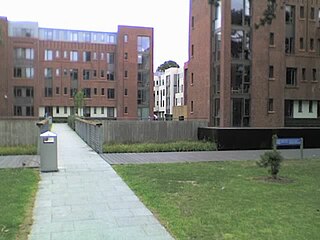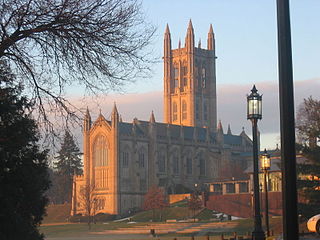
Trinity College is a constituent college of the University of Cambridge in England. With around 600 undergraduates, 300 graduates, and over 180 fellows, it is the largest college in either of the Oxbridge universities by number of undergraduates. In terms of total student numbers, it is second only to Homerton College, Cambridge.

Trinity College is one of the constituent colleges of the University of Oxford in England. The college was founded in 1555 by Sir Thomas Pope, on land previously occupied by Durham College, home to Benedictine monks from Durham Cathedral.

Trinity College, officially the College of the Holy and Undivided Trinity of Queen Elizabeth near Dublin, is the sole constituent college of the University of Dublin, a research university located in Dublin, Ireland. The college was founded in 1592 by Queen Elizabeth I as the "mother" of a new university, modelled after the collegiate universities of Oxford and Cambridge, but unlike these other ancient universities, only one college was ever established; as such, the designations "Trinity College" and "University of Dublin" are usually synonymous for practical purposes. The college is legally incorporated by "the Provost, Fellows, Foundation Scholars and other members of the Board" as outlined by its founding charter. It is one of the seven ancient universities of Britain and Ireland, as well as Ireland's oldest surviving university.
Trinity College is widely considered the most prestigious university in Ireland and amongst the most elite in Europe, principally due to its extensive history, reputation for social elitism and unique relationship with both the University of Oxford and the University of Cambridge. In accordance with the formula of ad eundem gradum, a form of recognition that exists among the three universities, a graduate of Oxford, Cambridge, or Dublin can be conferred with the equivalent degree at either of the other two universities without further examination. Trinity College, Dublin is a sister college to St John's College, Cambridge and Oriel College, Oxford.

An ad eundem degree is an academic degree awarded by one university or college to an alumnus of another, in a process often known as incorporation. The recipient of the ad eundem degree is often a faculty member at the institution which awards the degree, e.g. at the University of Cambridge, where incorporation is expressly limited to a person who "has been admitted to a University office or a Headship or a Fellowship of a College, or holds a post in the University Press ... or is a Head-elect or designate of a College".
The Regius Professorships of Divinity are amongst the oldest professorships at the University of Oxford and the University of Cambridge. A third chair existed for a period at Trinity College, Dublin.
In the universities of Oxford, Cambridge, and Dublin, Bachelors of Arts with Honours of these universities are promoted to the title of Master of Arts or Master in Arts (MA) on application after six or seven years' seniority as members of the university. As such, it is an academic rank, and not a postgraduate qualification. No further examination or study is required for this promotion.

Trinity Hall is the main extramural hall of residence for students of the University of Dublin, Trinity College in Dublin, Republic of Ireland. It is located on Dartry Road in Dartry near Rathmines, about three miles south of the College.
A choral scholar is a student either at a university or private school who receives a scholarship in exchange for singing in the school or university's choir. This is a common practice in the UK at schools attached to cathedrals where the choir is the Cathedral Choir, and at Oxford and Cambridge University Colleges, many of which have famous choirs.
Formal Hall or Formal Meal is a meal held at some of the oldest universities in the United Kingdom and the Republic of Ireland at which students usually dress in formal attire and often gowns to dine. These are held commonly in the colleges and halls of Oxford, Cambridge, Dublin, Durham, St Andrews, Bristol, Leeds, London, Nottingham, the Australian sandstone universities, and Toronto.
The Ladies' Challenge Plate is one of the events at Henley Royal Regatta on the River Thames at Henley-on-Thames in England. Crews of men's eight-oared boats below the standard of the Grand Challenge Cup can enter, although international standard heavyweight crews are not permitted to row in the Ladies' Plate.
Roger Boyle (1617?-1687) was an Irish Protestant churchman, Bishop of Down and Connor and Bishop of Clogher.
Thomas Elrington (1760–1835) was Provost of Trinity College, Dublin from 1811 to 1820, Bishop of Limerick, Ardfert and Aghadoe from 1820 to 1822, and Bishop of Ferns and Leighlin from then until his death in Liverpool on 12 July 1835.
Battle of the Blues may refer to:
John Stearne or Sterne (1624–1669) was an Irish academic, founder of the Irish College of Physicians.
Michael Ward was a Seventeenth century Anglican bishop and academic in Ireland.
The Most Rev. Anthony Martin, DD, MA was an Anglican priest in Ireland, the Bishop of Meath from 1624 until his death in July 1650.
Bartholomew Vigors was an Anglican priest in Ireland in the late seventeenth and early eighteenth centuries.
The Choir of Trinity College, Kandy, Sri Lanka, is a Boys' choir that continues a choral tradition dating back to the founding of the School in 1872. The choir plays a central role in Christian worship at the school, which was founded by the Church Missionary Society, and continues its affiliations to the Anglican Church of Ceylon.
Caesar Williamson was Dean of Cashel from 1671 until 1675.







